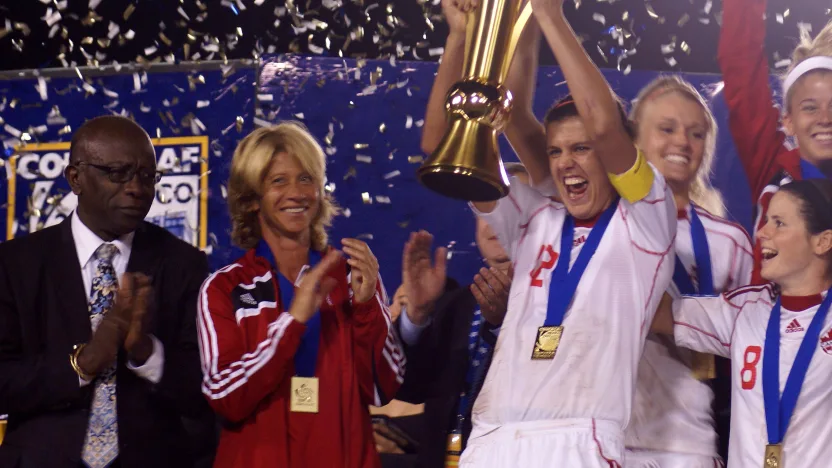Post-game coverage (video above) provided by OneSoccer.
Christine Sinclair’s record-breaking evening in Edinburg, Texas is certainly one of the greatest moments of her illustrious (20-year) international career. Indeed, it may even be at the top, from a certain point of view — it’s not every day you become the top international goalscorer of all time, after all. With 185 goals on her resumé, it’s hard to pick out the best of the bunch. Still, some goals mean more than others, and when you’re at the top of your game for as long as Sinclair has been, a few moments rise to the top. From her not-so-humble beginnings on the international stage 20 years ago to her mythic status here in this decade, Sinclair’s had a heck of a career. So, without further ado, let’s reminisce on some of the greatest moments that got her from highly-touted teenager to Canadian soccer GOAT.
RELATED READING: Christine Sinclair breaks goals record in CanWNT’s Olympic qualifying win
First impressions, at home and abroad
It didn’t take long for Sinclair to open her account on the international stage. She burst onto the scene for Canada as a 16-year-old at the 2000 Algarve Cup in Portugal, scoring three goals across four games as Les Rouges finished fifth. Sinclair scored eight minutes into her second-ever senior international appearance, finding the net against Norway a couple days after Canada was shut out by China. She added a brace in the fifth-place match, leading her side to a 3-2 win over Denmark. It hadn’t quite been clear before the tournament that Sinclair would be such a difference-maker for Canada as the youngest player on the team. She’d attended a couple of youth camps already, as well as a senior camp a month before the Algarve Cup, and she was certainly a highly-touted prospect, but perhaps the extent of how great she’d become wasn’t clear yet. The buzz got its start then in 2000, but it was only beginning.
Making history at the U-19 level in 2002
Two years after her senior international debut, Sinclair joined Canada on home soil for the FIFA U-19 World Championship in 2002. Wearing the captain’s armband, she was head and shoulders above the competition as she led the host team **in the first-ever FIFA-organized women’s youth tournament. She got off the ground quickly again with a 15th-minute goal in Canada’s first game, en route to dispatching Denmark 3-2. She scored twice against both Japan and Nigeria in the latter two group stage matches to put Canada on top of the group. By then, she’d warmed up. Canada lined up against England in the quarter-finals, in front of 23,595 fans at Edmonton’s Commonwealth Stadium. It was that day that Christine Sinclair truly revealed how much of a superstar she would become, as she slotted a jaw-dropping five goals in Canada’s 6-2 win. After trampling the Lionesses, Canada marched on to a meeting with Brazil, who boasted a counter to Sinclair in their own young star, the 16-year-old Marta. Although the Brazilian scored in the second half, it was Sinclair with the last laugh, as she scored in the penalty shootout just after Marta missed, to put Canada in the final. Although the Canadians fell to the USA in the gold medal match, Sinclair (and, in a way, Canadian women’s soccer) had officially arrived on the world stage, in front of thousands of home fans. Sinclair followed up her Golden Ball effort from the U-19 Championship with seven goals for Canada in the Concacaf Women’s Gold Cup just a couple months later. And of course, she scored three for Canada the following summer, at her first World Cup (one of which was four minutes into her first game against Germany). With a penchant for scoring early and often, Sinclair was already one of the women’s game’s brightest lights.
Continental glory, at last, in 2010

By the 2010 Concacaf Women’s Championships, Sinclair was a bona fide star. She’d scored 102 goals for Canada, and she’d played at two World Cups, but a proper championship was still missing. Canada had lost to their immovable foes, the United States, twice in a row at the continental tournament, having won the Concacaf Gold Cup just once before (in 1998). That all changed at the turn of the decade, when the Sinclair-led Canadians traveled to Mexico. They kicked off with a narrow 1-0 win over Trinidad and Tobago, and followed it up with an 8-0 thrashing of Guyana (which saw Sinclair put up four goals). The captain added a goal to help beat Costa Rica in the semi-final, and Canada advanced to play Mexico for the Gold Cup. The final was a frantic affair, but nobody managed to find the scoresheet — except for Sinclair. When a Mexico defender tried to play goalkeeper in the 52nd minute, Sinclair stepped up to coolly slot a penalty, ultimately securing the championship for Canada.
London 2012: A hat-trick and a controversy

How many Canadians can say they’ve scored a hat-trick at Old Trafford? Canada arrived at the London 2012 Olympics without any history of success at the competition, with just one previous appearance in women’s football (which ended in a quarter-final loss). Plus, they’d gone 0-3 just a year before at the World Cup. So, perhaps it wasn’t shocking when they stumbled out of the gate with a loss to Japan. Sinclair and her fellow juggernaut Melissa Tancredi did guide Canada out of the group stage, albeit in third place, with a win over South Africa and a draw with Sweden. Daunted by their low seed and difficult knockout route? Not in the slightest. Sinclair, ever Canada’s leader, scored in their quarter-final win over hosts Great Britain to set up a semi-final with (who else?) the United States, at the Theatre of Dreams. Canada had lost to their rivals 2-1 a few weeks before the Olympics, and 4-0 in January of that year. Remember how this one went, though? Well, try as the Americans might, they could not silence Sinclair, who gave Canada the lead three times, but this match was slated for extra time. It ended… dramatically. Goalkeeper Erin McLeod was whistled down for time-wasting on a goal kick, and the ensuing indirect free kick won the U.S. a penalty in extra time. Abby Wambach’s goal sent her side into the gold medal match, and the Canadians into a fury. Sinclair made headlines by criticizing the refereeing, earning a four-match suspension for claiming “the ref decided the result before it started.” Canada went on to win bronze against France, but it’s that semi-final that was the enduring memory — indeed, perhaps the most iconic moment in Sinclair’s career. It earned her an Olympic golden boot, and the right to carry Canada’s flag at the closing ceremony.
